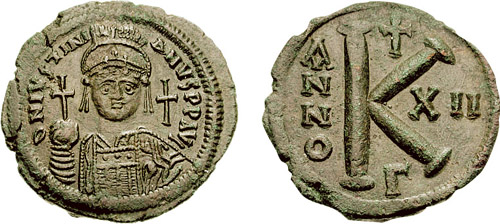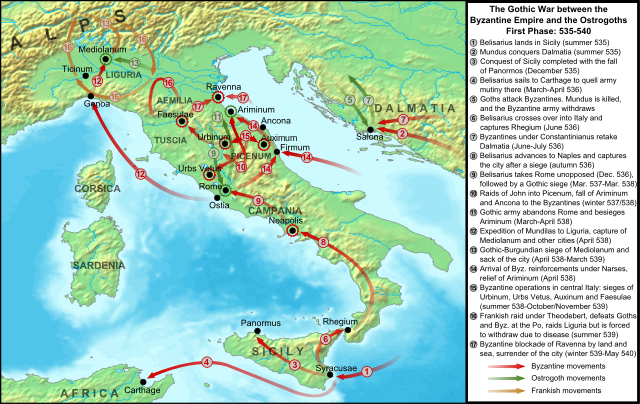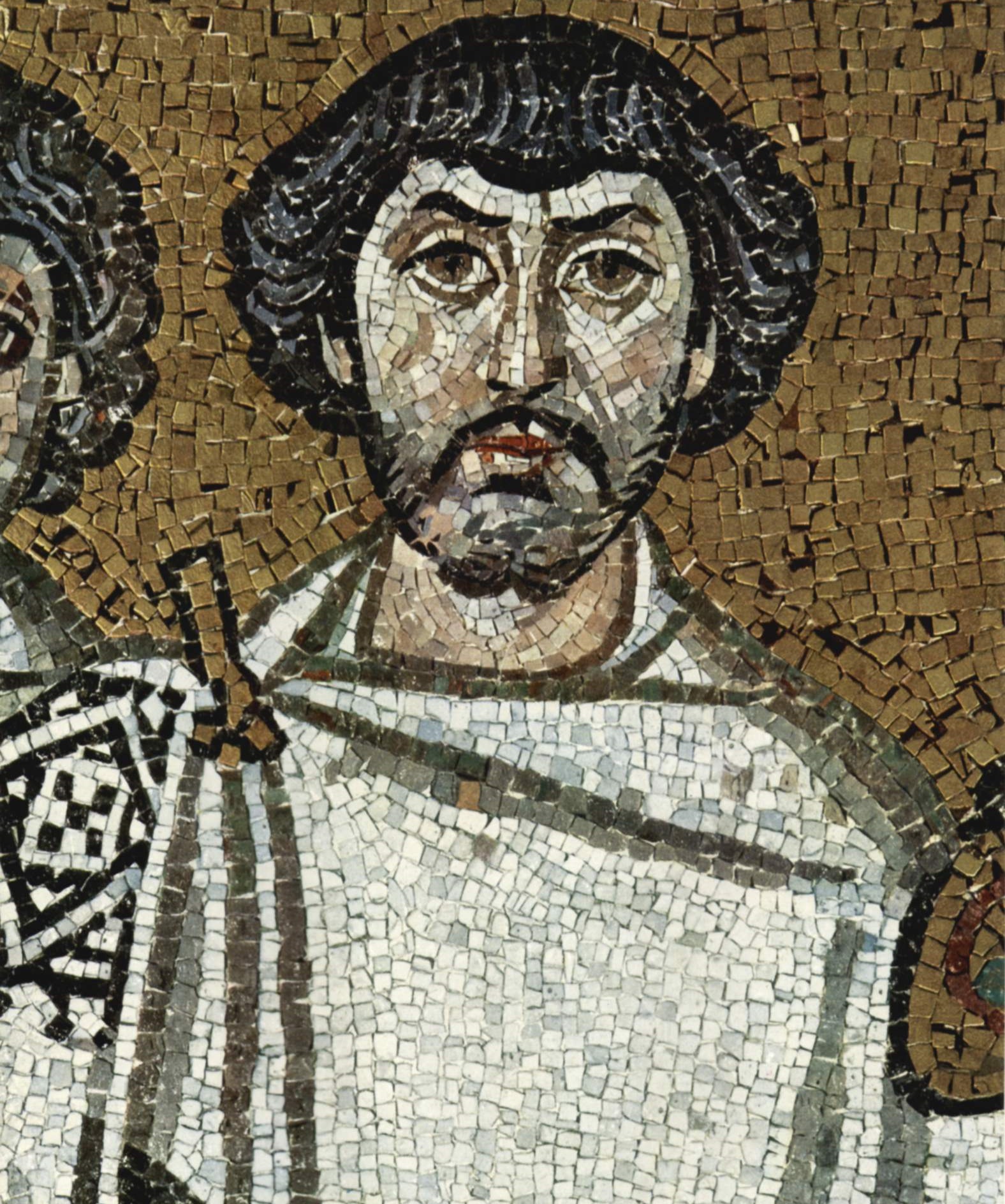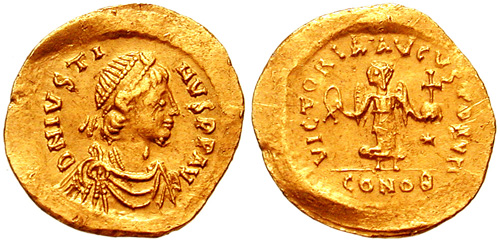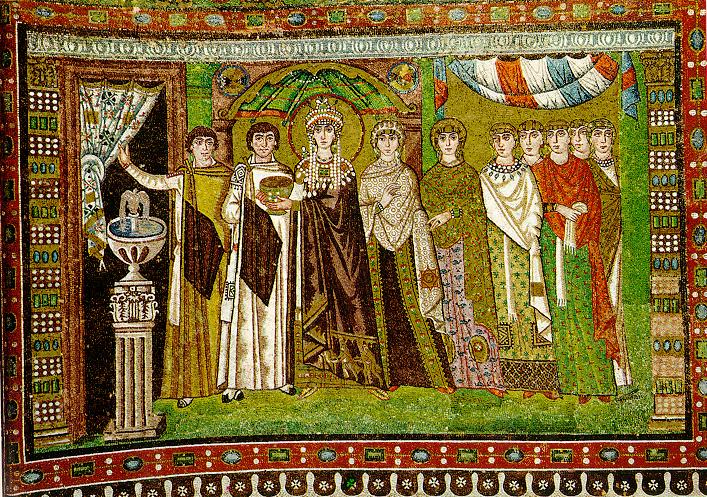T
he outer
fringes of the Byzantine Empire were now suffering from depredation. There was
insurrection, started by Moorish tribes, spreading across Africa. While the
Ostrogoths were hitting back in Italy and had recaptured Naples. In Persia
Chosroes’ plans for yet another attack on the empire had been stymied by
further bout of the plague and a rebellion fomented by one of his sons. But
this was offset in late summer by the annihilation of a large Byzantine army by
a much smaller Persian force. The army had been marching into Persian held
Armenia.
 |
| Assassination of Chosroes |
Trouble in Italy
In Italy the
Goths had chosen a new king, Hildebad, but he had not much more than a thousand
fighting men. Five Byzantine generals of secondary abilities were stationed in
Italy, with no one supreme commander. In May 541 Hildebad was beheaded by one
of his guards. His successor tried to come to terms with Justinian and he too
died a violent death.
The new king
now elected was known as Totila and was Hildebad's nephew. Totila was to bring
about a resurgence of Goth fortunes. Totila had been negotiating with the
Byzantines, but when elected to the kingship declared war. Aware that the Goths
were a minority in the country Totila courted the Italian lower and middle
classes. They threw their lot in with Totila and his men in an attempt to throw
off the yoke of empire; having been subject to the rapacity of Justinian’s tax
collectors[i].
Within
months of his accession Totila was able to throw back an imperial army of
twelve thousand men from the gates of Verona and wiped out another in a pitched
battle outside Faventia[ii]. In spring 542 AD the
Goths routed the army of Vitalian’s nephew John, the ablest of the five
Byzantine generals in Italy. Totila’s army now laid siege to Naples.
Totila besieging Florence
Justinian
appointed a Praetorian Prefect who took up residence in Syracuse and refused to
leave the town. Totila defeated a naval expedition sent to relieve Naples and a
second expedition, sent by the prefect in January 543 AD, was destroyed in a
storm. In May the Neapolitans surrendered.
The Byzantine garrison were allowed to leave in peace with all their
possessions and ships were provided to take them to Rome. For the remainder of
the year Totila strengthened his hold on the peninsula.
In January
544 AD the Byzantine generals based in Italy wrote to Justinian informing him
that they could no longer defend Byzantine interests. This letter convinced
Justinian to send Belisaurus back to Italy. Totila addressed an appeal to the
Senate in Rome
‘Surely in these evil days
you must sometimes remember the benefits you were wont to receive, not so very
long ago, at the hands of Theodoric and Amalasuntha…….My Roman friends, only
compare the memory of those rulers with what we now know of the conduct of the
Greeks towards their subjects.’[iii]
John, the
nephew of Vitalian, forbad the Senate to reply and Totila tried a direct appeal
to the Roman populace. The populace, perhaps put off by the military based in
the city, did not rise up. Totila had been busy in the south besieging
Hydruntum[iv]. He left a small force to
continue the siege and marched most of his troops to Rome.
Belisaurus Returns
Belisaurus
was given command of the army in the west, although he had hoped for the
eastern command. Antonina refused to return to somewhere she had been so
grossly insulted and in this she was supported by the empress.
In May 544
AD Belisaurus returned to Italy, not ranked as Magister Militum but as Comes
Stabuli[v]; but Justinian had given
him only inexperienced troops, little authority and no funds. Within a year he
had raised the siege of Hydruntum, and Auximum and rebuilt the walls of Pesaro.
Belisaurus had however seen desertions from his troops, many of whom had not
been paid for over a year. With a population hostile to his forces and all they
represented Belisaurus was facing an uphill task.
In May 545 AD he wrote to Justinian informing
the emperor that he desperately needed men, horses, military equipment and
money. The letter was sent in the hands of John, who dallied in Constantinople
for long enough to woo and marry the emperor’s cousin, thus increasing his
influence in the imperial court. He finally returned bring a large force of
Romans and barbarians under his own command and an Armenian general named
Isaac.
The Fall of Rome
 |
| Totila |
As the new
Byzantine forces landed Totila’s army arrived at the walls of Rome and laid
siege to the city. Bessas, the commander of the garrison was of Goth origin and
his loyalties were uncertain; having failed to lay in emergency supplies[vi]. Totila’s fleet lay at
the mouth of the Tiber. Belisaurus’s relief force broke through the chains laid
across the river. Part of the army had been left in control of Portus, with
supplies, reserves, the last few vessels and most important of all for
Belisaurus, his wife Antonina, under the control of General Isaac.
About to
attack the last major obstacle on the Tiber, before Rome, Belisaurus was
informed that Isaac was dead. Isaac had been informed that he was not to leave
his post under ANY circumstances. Belisaurus assumed that Portus had been taken
and his enemies now had Antonina in their hands. He called off the attack and
returned, only to find that Isaac had disobeyed orders and had attacked Ostia.
Portus and Antonina were safe.
‘Totila was desperate to
catch him outside a protecting wall; but he failed to make contact, as
Belisaurus and the entire Roman army were in the grip of panic fear, with the
result that he not only failed to recover a yard of lost ground but actually
lost Rome as well, and very nearly everything else.’[vii]
This last
chance to relieve Rome was lost as a result of Isaac’s disobedience and
Belisaurus’s uxorious inclinations. In December 546 AD a group of disaffected
soldiers opened the Asinarian gate and the Goths finally retook the city.
Bessas fled with most of the garrison and some nobles. The population took
refuge in the city’s churches.
Totila sent
ambassadors to Justinian suggesting peace.
‘It is our wish that you
should accept for yourself the blessings of peace, and that you should also
grant them to us…….we have excellent examples and reminders in Anastasius and
Theodoric, who ruled not long ago and whose reigns were given over to peace and
prosperity.’[viii]
Justinian
was unwillingly to ‘throw away’ the last ten years of campaigning and the loss
of his cherished ambition to re-unite the two halves of the old Roman Empire.
He claimed that Belisaurus was the person to whom the proposals should be
addressed. Rome was recaptured in April 547 AD and held for three years before
it was lost again.
Religious Disputes
Justinian
was now heavily involved in theological matters. The orthodox view of the
identity of Christ had been laid down by the Council of Chalcedon nearly a
century before. In himself Christ united the human and divine. This viewpoint
had never been accepted by the monophysites (of whom Theodora was one) who
believed in only a divine aspect to Christ.
The
monophysites were to be found in the eastern Mediterranean and were too
numerous to be eliminated. Egypt, the empire’s source of grain, was a centre
for the monophysites and harsh treatment could incite a rebellion. Treating
them too well ran the risk of upsetting the orthodox. For years Justinian had
been outwardly rigid, but his hard line was tempered by Theodora, who had
maintained a discreet monastery in the Great Palace.
Now a
charismatic new leader, Jacob Baradeus, was championing the monophysite cause.
He was consecrated Bishop of Edessa in 543 AD, by the exiled Patriarch of
Alexandria; although unable to take up his see Jacob embarked on a mission to
revive monophysitism. He travelled through Syria, Palestine, Mesopotamia and
Asia Minor consecrating thirty bishops in his travels and ordaining several
thousand priests.
Justinian
was already being criticised for his ‘hands-off’ policy towards the
monophysites, yet their newly awakened fanaticism required careful handling if
rebellion against the empire was not to ensue. He chose instead to chastise the
Nestorians, an obscure sect who proclaimed the humanity of Christ rather than
his divinity. Very few remained in the empire, most had fled to Persia; the
paucity of Nestorians in the empire meant that action against them would not
cause the crises that attacking the monophysites might. The Nestorians had the
additional attraction of being hated by Orthodox and monophysites alike.
The
anti-Nestorian edict in 544 AD pleased very few; the orthodox toed the
emperor’s line, somewhat unwillingly. The monophysites were unappeased, having
expected concessions from Justinian, while the Roman clergy were livid with
anger. Justinian had condemned writings accepted by the Council of Chalcedon
and the papal legate in Constantinople pronounced a ban on the Patriarch.
Justinian had offended the Roman church at a problematic time in Italy for the
empire.
In the
autumn of 545, as Totila’s army surrounded Rome, a company of excubitors seized
Pope Vigilius and carried him off down river. He was taken to Catania in
Sicily, where he stayed for a year, not arriving in Constantinople until
January 547 AD. He still stood firm in refusing to condemn the works disparaged
in Justinian’s edict of 544 AD. Vigilius was given a palace of his own, but
even so placed the patriarch and all bishops, who had subscribed to the edict,
under several months excommunication.
Pressure
from Theodora and Justinian resulted in a show of reconciliation between
Vigilius and the Patriarch Mennas on 29th June. The Pope also handed
Justinian his signed condemnation of the chapters referred to in the edict. The
condemnation was not published until April 548 AD.
Eleven weeks
later Theodora was dead. After her death many of her former protégés repudiated
statements made during her lifetime, supporting the edicts. Vigilius’ actions
had weakened the authority of the Council of Chalcedon and he was reviled as a
turncoat; some African bishops excommunicated him.
Bibliography
Byzantium –
The Early Centuries – John Julius Norwich, Folio Society 2003
The Secret
History – Procopius – Folio Society 1990
En.wikipedia.org
[i] The tax collectors were given one twelfth of all they collected.


